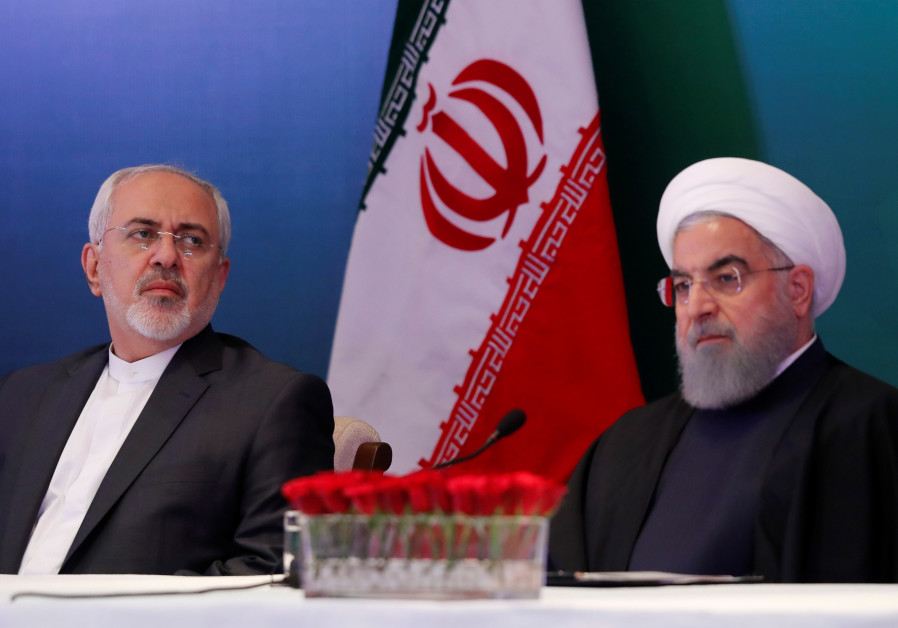Int’l financial group: Iran must comply with anti-terror oversight by Oct.

Iranian President Hassan Rouhani (R) and Foreign Minister Mohammad Javad Zarif attend a meeting with Muslim leaders and scholars in Hyderabad, India, February 15, 2018. (photo credit: DANISH SIDDIQUI/ REUTERS)
The Financial Action Task Force (FATF) on Friday once again extended its deadline for Iran until October to come into compliance with anti-terrorism financial measures or said it will face tougher financial oversight.
At the same time, the influential global financial organization said it would “continue the suspension of counter-measures,” for the time being, with the exception of one counter-measure, giving the Islamic Republic breathing room. The counter-measure that was reimposed, according to Secretary of the US Treasury, Steve Mnuchin, was increased supervision.
He said “FATF responded to Iran’s willful failure to address its systemic money laundering and terrorist financing deficiencies by requiring increased supervisory examination for branches and subsidiaries of financial institutions based in Iran and calling for additional counter-measures to be re-imposed if Iran does not make further progress.”
The FATF, also known by its French name, Groupe d’action financière, is an intergovernmental organization founded in 1989 on the initiative of the G7 to develop policies to combat money laundering. In 2001 its mandate expanded to include terrorism financing. After years of campaigning and modernizing its financial counter-terrorism apparatus, Israel joined the FATF in December.
Toby Dershowitz, FDD’s Senior Vice President for Government Relations and Strategy at the non-partisan Foundation for Defense of Democracies, told The Jerusalem Post on Friday:
FATF is correctly keeping Iran on its blacklist, or Public Statement, a place Tehran sits along with North Korea. FATF also reimposed one countermeasure which requires increased ‘supervisory examination”’of branches and subsidiaries of its banks.
As victims of its corruption, the people of Iran know best that their government runs amok of global standards. But the security and integrity of the global financial system are also victims of Iran’s willful and persistent failure to comply with FATF’s standards. Risk managers from banks and financial institutions justifiably continue to be wary of doing business with Iran and should be wary until Iran chooses a different path, one that abandons terror financing and rampant systemic money laundering. It’s not more time that Iran needs. It’s a strategic choice Iran needs to make and it’s obvious to all it has not done that.”
Since the 2015 Iran nuclear deal, FATF has generally given the Islamic Republic more breathing space, taking its cue from its EU members who are still trying to hold the deal together despite US opposition.
While a series of opeds in the US, which hosted the FATF conference in Friday, called on the organization to finally take clear punitive measures against Iran, all along there was suspicion that the EU members would keep any FATF action limited – especially with the current unstable situation between the US and Iran.
Regarding Iran, the FATF statement said that, “While welcoming the passage [by Iran] of the Anti-Money Laundering Act, the FATF expresses its disappointment that the Action Plan remains outstanding and expects Iran to proceed swiftly in the reform path to ensure that it addresses all of the remaining items.”
The FATF added that if by October 2019 Iran does not enact the remaining legislation in line with FATF Standards,then the FATF “will require introducing enhanced relevant reporting mechanisms or systematic reporting of financial transactions; and increased external audit requirements for financial groups with respect to any of their branches and subsidiaries located in Iran.”
In January, Iran passed some new measures for countering terror financing, but the country still is having internal disagreements about finalizing certain other measures which FATF has been pressing Tehran on in recent years.
Moreover, “The FATF also expects Iran to continue to progress with enabling regulations and other amendments. Iran will remain on the FATF Public Statement until the full Action Plan has been completed.”
The FATF public statement also mentions North Korea and is usually both a sign of shame and of potentially facing a financial crackdown for being too weak on combating terror financing.
Join Jerusalem Post Premium Plus now for just $5 and upgrade your experience with an ads-free website and exclusive content. Click here>>






Comments are closed.